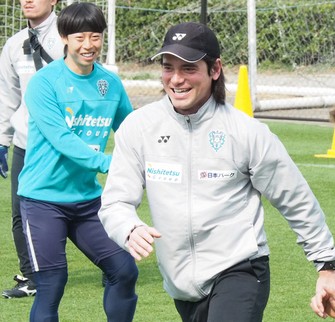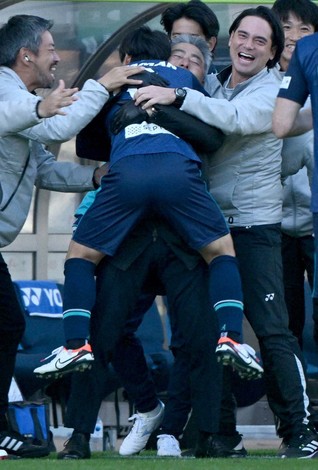
Portuguese-Japanese interpreter Marco Gustavo, front, provides language support during an Avispa Fukuoka soccer club practice session at the Gannosu Recreation Center in the city of Fukuoka, March 24, 2025. (Mainichi/Yukiko Tange)
FUKUOKA — When Marco Gustavo first arrived in Japan from Brazil 30 years ago, following his father’s decision to work abroad, his Japanese vocabulary was limited to just three words: “arigato” (thank you), “ohayo” (good morning) and “toire” (toilet). Now 40 years old and serving as an interpreter for the Avispa Fukuoka soccer club in the top-tier Japanese professional league J1, Gustavo recalls how his struggle to learn the language and his pride in maintaining Portuguese, his native tongue, which became instrumental in opening doors to his current career in soccer.
In 1994, following his father’s retirement as a professional soccer player, the family moved to Oizumi, Gunma Prefecture, known for its large Brazilian community. Gustavo’s mother is a second-generation Japanese Brazilian, but barely spoke Japanese. Gustavo enrolled in a local public elementary school, but spent most of his time in a separate classroom dedicated to Japanese language lessons.
However, Gustavo disliked feeling isolated. Determined, he began approaching classmates by connecting the few words he knew. He discovered that whenever he made the effort to communicate, the other children responded willingly. Through conversations and corrections, his Japanese gradually improved.
Since childhood, influenced strongly by his father who had played for renowned Brazilian clubs including Santos FC, Gustavo had naturally envisioned becoming a soccer player himself. But after moving to Japan, reality hit harder than expected. After finishing high school in the central Japan city of Kanazawa, where his father’s career had relocated them, Gustavo began working a factory job. Alongside this, he was a goalkeeper for Teihens FC, a club in the regional Hokushinetsu Football League. Later, in 2012, he transferred to another regional team, Cobaltore Onagawa, operating in the Tohoku Soccer League.
One day, while watching a J-League soccer match on TV, Gustavo casually tried interpreting the interview of a Brazilian player. Surprisingly, his translation closely matched what he heard from the TV interpreter. The experience ignited a spark, leading him to think, “Maybe I could do this, too.” Encouraged by this realization, Gustavo sent resumes to several Japanese clubs.

Interpreter Marco Gustavo (front right) celebrates during an Avispa Fukuoka match against the Urawa Reds in November 2024. During games, Gustavo provides support from the team bench. (Mainichi/Yoshiyuki Hirakawa)
A few months later, in the summer of 2012, Gustavo heard from Montedio Yamagata, a second-division J2 club needing a Portuguese interpreter due to a newly acquired Brazilian player. Initially, the club saw him as only a backup candidate if another interpreter they were negotiating with fell through. Unable to contain his eagerness, Gustavo took matters into his own hands and directly reached out to Yamagata’s recruiting staff. “I’ll quit my current job right now and end my playing career immediately. Please give me this opportunity,” he declared. Impressed by his enthusiasm, the club hired him.
Entering professional soccer turned out differently from Gustavo’s original expectations. “Translating what coaches and players said actually constituted just a small portion of the job. The gap was huge,” Gustavo admits, though he also recalls how fulfilled he felt. After working with other clubs such as J2’s JEF United Chiba, he joined Avispa Fukuoka in 2020, continuing to support players as an interpreter.
The cornerstone of his professional philosophy is clarity of communication. “No matter how beautiful translated words may be, if you can’t successfully convey the true intent or passion behind the speaker’s words, it’s meaningless,” Gustavo asserts. He continues to approach interpreting with this conviction, stating, “Only when I see players succeed after hearing my words, do I truly feel I have done my job accurately.” This dedication stems directly from Gustavo’s early struggle to learn Japanese.
Equally crucial for Gustavo is avoiding becoming players’ “personal assistants.” Although he supports athletes extensively — including assisting their families — he maintains firm boundaries, insisting, “I carefully show them how to do things when it’s their first time, but after that, I encourage them to handle it themselves. Once they gain confidence, players and their families have more opportunities to go out and enjoy life in Japan. The goal is always their independence.”
His work is admired by players such as forward Wellington, 37, who appreciates Gustavo’s methods. Wellington notes, “I want to improve my Japanese and learn about Japanese culture. I rely only on minimal help in private matters. Such a relationship really benefits me.”
Now approaching his 13th year as an interpreter in professional soccer, Gustavo reflects gratefully on his career path. “I couldn’t become a professional soccer player, but I’ve been fortunate enough to build a career within the sport I love. Interpreting is probably my true calling after all. Every day is engaging and fulfilling,” he says.
(Japanese original by Yukiko Tange, Fukuoka Sports News Department)


AloJapan.com